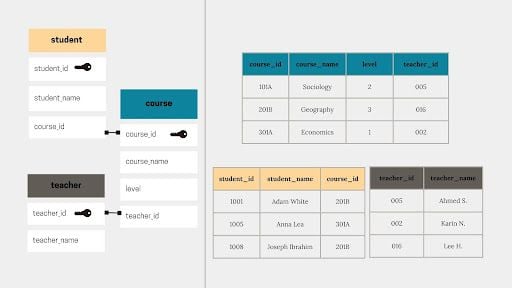PostgreSQL is an open-source, object-relational database management system (RDBMS) that uses SQL for data management and supports advanced features like complex data types and scalability.
What Is PostgreSQL?
PostgreSQL is an open-source relational database management system (RDBMS) that supports advanced SQL features and complex data types, and can scale from small applications to enterprise deployments.
PostgreSQL supports data types ranging from standard types like integer, serial and monetary to advanced types such as arrays, JSON, geospatial and user-defined.
It also includes features like transaction support, full-text search and foreign key constraints, and can scale vertically or horizontally with extensions like Citus for enterprise deployments.
How Does PostgreSQL Work?
PostgreSQL can be accessed through several tools. Advanced users often use psql, a command-line interface, while beginners may prefer PgAdmin4, a graphical tool included with PostgreSQL installation.
Like other RDBMSs, PostgreSQL stores data in tables, where rows hold records and columns define attributes. Each row has a unique identifier, and tables are organized by schemas that define structure and relationships. Queries can filter, select and join data, with indexes available to speed up retrieval.
Benefits of PostgreSQL
PostgreSQL is one of the most widely used open-source database systems, often cited for its advanced SQL compliance and extensibility.
ACID-Compliant
It is an ACID-compliant RDBMS. In other words, it offers atomicity, consistency, isolation and durability features. PostgreSQL’s advanced features include stored procedures, triggers, user-defined functions, transactions and replication.
Supports Large-Scale Deployments
PostgreSQL supports large-scale deployments with features like parallel query execution, replication and clustering for high availability and performance. Thus, you can deploy PostgreSQL in a distributed architecture, which can handle large volumes of data.
Open-Source
Another important feature of PostgreSQL is that it’s open source, which makes it an affordable solution for businesses to keep costs low. Also, PostgreSQL has an excellent track record of reliability and data security. It’s been used in production by customers for decades and is trusted by many organizations and businesses worldwide.
Integrates With Multiple Tools
PostgreSQL integrates well with data tools such as DBeaver, pgAdmin, Tableau and programming languages like Python and Java. You can easily integrate it with various applications. It’s also supported by third-party tools, extensions and other programming languages, like Python.
PostgreSQL Example
Let’s look at an example. This database contains three related tables: student, course and teacher. Each table has a unique column that acts as the primary key for that table. For example, the primary column for the course table is the course_id column. Foreign keys are also important to relate one table to other tables. For example, the course_id column is a foreign key in the student table.

When you create your PostgreSQL database and tables, you can query the database using SQL. For example, we can select all students that are part of a course like this in SQL.
SELECT * FROM student WHERE course_id = '201B';The output is a list of students that are currently reading the 201B course: Adam White and Joseph Ibrahim.
PostgreSQL vs. MySQL
Many people consider PostgreSQL and MySQL the two most popular relational database management systems available today. However, architectural differences between the two databases have an effect on the core capabilities and features they offer.
PostgreSQL offers more advanced functions, like handling complex queries and advanced data types, while MySQL offers fewer features on advanced functionalities and data types. Thus, setting up and managing MySQL databases is simpler than PostgreSQL. On the other hand, PostgreSQL is ideal for large data sets and large numbers of users when you need feature-rich database management.
What Are Alternatives to PostgreSQL?
Oracle or Microsoft SQL for RDBMS
PostgreSQL is a mature, open-source relational database management system known for its scalability, reliability and security. It serves as a high-performance alternative to proprietary systems like Oracle and Microsoft SQL Server and integrates with tools such as DBeaver and QGIS.
Apache Kafka or Amazon Kinesis for Real-Time Data Streaming
PostgreSQL also excels at managing large, mission-critical data sets and supports low-latency queries, but real-time streaming workloads are typically better handled by event-driven platforms like Apache Kafka or Amazon Kinesis.
Frequently Asked Questions
What is PostgreSQL used for?
PostgreSQL is a relational database management system used to store and manage structured data. It supports complex queries, advanced data types and features like transactions, full-text search and foreign key constraints. PostgreSQL powers websites, applications and enterprise systems.
Is PostgreSQL better than MySQL?
PostgreSQL can offer more advanced functions and support for complex data types in comparison to MySQL, making it well suited for large data sets and feature-rich systems. MySQL is simpler to set up and manage, but less capable for advanced queries and scalability.
Is PostgreSQL good for large data?
Yes. PostgreSQL is designed for robust, mission-critical workloads and can handle large data sets and many users, scaling vertically and horizontally (with the use of extensions) for enterprise deployments.





